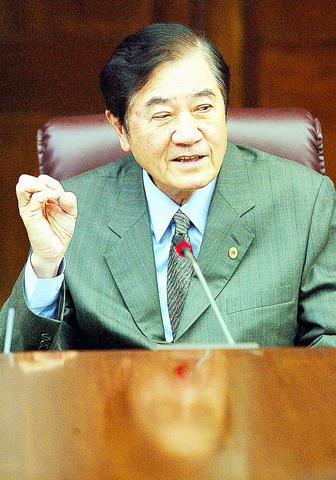Minister of Foreign Affairs Mark Chen (陳唐山) yesterday blasted Singapore Foreign Minister George Yeo (楊榮文) for telling the UN that actions by Taiwan's independence groups could lead to war with China.
"Singapore holds China's lan pa (卵葩, LP) with its hands, if I may use these ugly words," a fuming Chen said.

PHOTO: CNA
In the Hoklo language (also known as Taiwanese), lan pa means "testicles"; saying that someone holds another's lan pa means that he is fawning over that person.
Chen was speaking during a meeting with a pro-independence group which had requested that the Ministry of Foreign Affairs change the name of Taiwan's representative office in Japan to better express Taiwan's sovereignty.
Chen lamented Taiwan's status in the international community, saying "even a tiny garden country like Singapore, which only has 3 million people, can criticize us."
"Singapore is a country only as big as a piece of snot," he added.
The minister, who returned from the US yesterday, was clearly irritated by Yeo's speech in the 59th session of the UN General Assembly in New York last Friday.
Yeo told the General Assembly that "the push towards independence by certain groups in Taiwan is most dangerous because it will lead to war with mainland China and drag in other countries ... At stake is the stability of the entire Asia-Pacific region."
Taiwan's 12th bid to join the UN failed earlier this month.
Quoting Yeo's statement to the pro-independence group yesterday, Chen said people in Taiwan need to persevere if they want to survive.
"Where is justice in the world? This world has no justice," Chen said. "When [Singaporean Prime Minister] Lee Hsien Loong (李顯龍) visited us two months ago, we treated him very well. He came under tremendous pressure [from China] after the trip."
China's pressure influenced Singapore to make the speech in the UN, but "Yeo's remarks went too far," the minister complained.
But Chen said Yeo had done at least one good thing by delivering the UN speech.
"Yeo mentioned that some people in Taiwan want independence," Chen said. "Many countries probably didn't know there are people in Taiwan desiring independence before Yeo talked about it."
Thanks to Yeo's statement, these countries would now "realize our ambition" to achieve independence, he said.
The independence group had appealed to Chen to change the name of the Taipei Economic and Cultural Representative Office in Japan by replacing the word "Taipei" with "Taiwan." The group said the name downgraded the country's status as a state. It asked the ministry to negotiate with the Japanese government about the name change as soon as possible.
"I think the group made the right appeal," Chen said. "Many of us are not clear what our national title is. Even I, as foreign minister, often forget the names of our overseas representative offices. This is ridiculous."
Chen was referring to the various names Taiwan's overseas representative offices have been forced to adopt to prevent political pressure from China being applied on those countries.
Meanwhile, the minister also said that the arrest of Donald Keyser, the former US deputy assistant secretary for East Asian and Pacific affairs, would not affect Taipei-Washington relations. Chen stressed that Taiwan wanted to maintain good ties with the US.
"Taiwan has no reason to steal classified information from the US," he said.

DEFENSE: The National Security Bureau promised to expand communication and intelligence cooperation with global partners and enhance its strategic analytical skills China has not only increased military exercises and “gray zone” tactics against Taiwan this year, but also continues to recruit military personnel for espionage, the National Security Bureau (NSB) said yesterday in a report to the Legislative Yuan. The bureau submitted the report ahead of NSB Director-General Tsai Ming-yen’s (蔡明彥) appearance before the Foreign and National Defense Committee today. Last year, the Chinese People’s Liberation Army (PLA) conducted “Joint Sword-2024A and B” military exercises targeting Taiwan and carried out 40 combat readiness patrols, the bureau said. In addition, Chinese military aircraft entered Taiwan’s airspace 3,070 times last year, up about

A magnitude 4.3 earthquake struck eastern Taiwan's Hualien County at 8:31am today, according to the Central Weather Administration (CWA). The epicenter of the temblor was located in Hualien County, about 70.3 kilometers south southwest of Hualien County Hall, at a depth of 23.2km, according to the administration. There were no immediate reports of damage resulting from the quake. The earthquake's intensity, which gauges the actual effect of a temblor, was highest in Taitung County, where it measured 3 on Taiwan's 7-tier intensity scale. The quake also measured an intensity of 2 in Hualien and Nantou counties, the CWA said.

The Overseas Community Affairs Council (OCAC) yesterday announced a fundraising campaign to support survivors of the magnitude 7.7 earthquake that struck Myanmar on March 28, with two prayer events scheduled in Taipei and Taichung later this week. “While initial rescue operations have concluded [in Myanmar], many survivors are now facing increasingly difficult living conditions,” OCAC Minister Hsu Chia-ching (徐佳青) told a news conference in Taipei. The fundraising campaign, which runs through May 31, is focused on supporting the reconstruction of damaged overseas compatriot schools, assisting students from Myanmar in Taiwan, and providing essential items, such as drinking water, food and medical supplies,

New Party Deputy Secretary-General You Chih-pin (游智彬) this morning went to the National Immigration Agency (NIA) to “turn himself in” after being notified that he had failed to provide proof of having renounced his Chinese household registration. He was one of more than 10,000 naturalized Taiwanese citizens from China who were informed by the NIA that their Taiwanese citizenship might be revoked if they fail to provide the proof in three months, people familiar with the matter said. You said he has proof that he had renounced his Chinese household registration and demanded the NIA provide proof that he still had Chinese